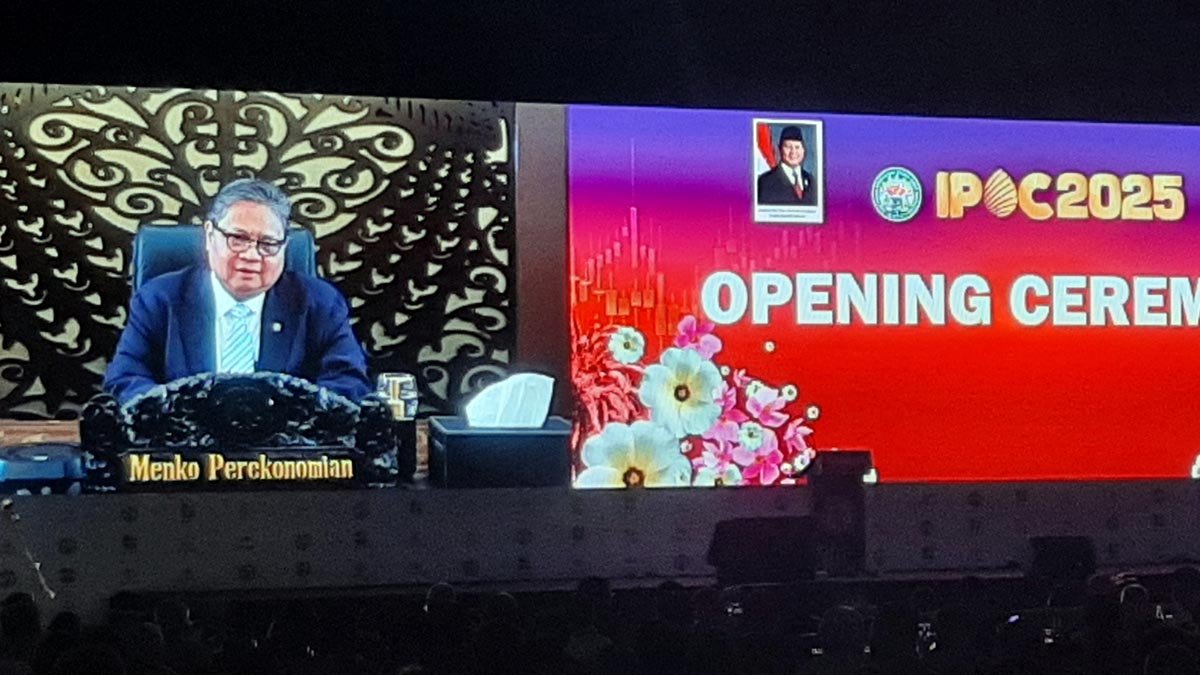PALMOILMGAZINE, BALI, — Coordinating Minister for Economic Affairs Airlangga Hartarto, in his opening remarks at the 21st Indonesian Palm Oil Conference (IPOC) and 2026 Price Outlook in Bali, highlighted Indonesia’s strong economic performance and the strategic importance of the palm oil industry amid global uncertainty.
In his keynote address, Airlangga emphasized that Indonesia continues to be a bright spot amid the global economic slowdown, as noted by IMF Managing Director Kristalina Georgieva. “The manufacturing and agriculture sectors remain the largest contributors to our GDP,” he said, adding that household consumption continues to drive growth, expanding by 4.89%, supported by government stimulus and increasing public mobility.
He explained that investment performance also showed solid progress. The realization of domestic investment reached IDR 1,400.3 trillion, representing a 13.7% year-on-year growth in the third quarter of 2025. Meanwhile, the Purchasing Managers’ Index (PMI) stood at 51.2, signaling continued expansion in the manufacturing sector. Inflation, recorded at 2.86% in October, remained well under control.
Also Read: Indonesia Sets November 2025 Biodiesel Price at IDR 14,036 per Liter
To maintain this positive momentum, Airlangga stated that the government continues to implement counter-cyclical policies, including accelerating state spending, strengthening social protection programs, and providing consumption and transportation incentives ahead of the Christmas and New Year holidays.
Palm Oil: A Pillar of Economic Strength
Airlangga underscored that palm oil remains one of Indonesia’s most important economic pillars. In September 2025, Indonesia’s trade surplus reached USD 4.34 billion, with palm oil being one of the main contributors. From January to September 2025, Indonesia’s palm oil exports reached 28.55 million tons, with India and China as the largest buyers, followed by growing markets in Japan and New Zealand for non-oil palm-based products.
“At the smallholder level, the average price of fresh fruit bunches (FFB) remains around IDR 3,000 per kilogram, providing a positive impact on farmers’ welfare,” Airlangga said.
To strengthen the industry’s competitiveness and sustainability, the government continues to enhance the Indonesian Sustainable Palm Oil (ISPO) certification system. “We want to ensure our palm oil production aligns with environmental and global standards,” he stated.
Also Read: Indonesia Palm Oil Hackathon 2025: Young Digital Innovators Strengthen the Future of Palm Oil
He also revealed that the government is developing the ISPO Information System, a digital platform that integrates policy, certification, and trade data. “This system will improve transparency and allow real-time product tracking,” he added.
Advancing Toward Clean Energy
Airlangga also highlighted Indonesia’s commitment to transforming palm oil into clean energy through one of the world’s largest biofuel programs. “Our biodiesel program, currently at B40, will advance to B50 by the second semester of 2026,” he announced.
He noted that Indonesia’s greenhouse gas emissions have been reduced by around 41.46%, and the government is preparing to utilize palm oil-based sustainable aviation fuel (SAF). “Within two to three years, we hope this product can enter full commercial production,” he said.
Strengthening Downstream Industries
The Coordinating Minister reiterated that Indonesia must continue to add value to its palm oil products rather than exporting raw materials. “Downstream development creates more jobs, strengthens our industry, and enhances national competitiveness,” he said.
As an example, Airlangga cited the collaboration between the Ministry of Defense and the Palm Oil Plantation Fund Management Agency (BPDP) in developing defense industry products using palm oil–based materials. “This initiative shows how local resources can be used to support strategic national industries,” he said.
Collaboration for a Sustainable Future
At the conclusion of his speech, Airlangga expressed appreciation to the Indonesian Palm Oil Association (GAPKI) and all stakeholders for successfully organizing the event. “I officially declare the 21st Indonesian Palm Oil Conference 2025 open. May this conference bring forth productive discussions, new partnerships, innovative ideas, and a more sustainable future for Indonesia’s palm oil industry,” he said.
With that declaration, Airlangga Hartarto officially opened the 21st Indonesian Palm Oil Conference and 2026 Price Outlook, marking another milestone for Indonesia’s leading agribusiness sector in promoting sustainability, innovation, and national economic resilience.
Don’t miss out! Stay up to date with the latest IPOC 2025 news at Palmoilmagazine.com. (P3)
